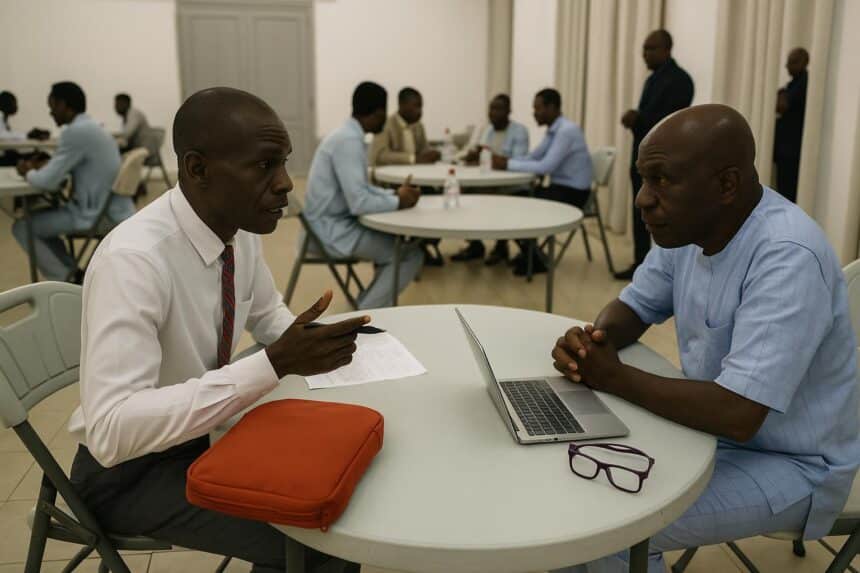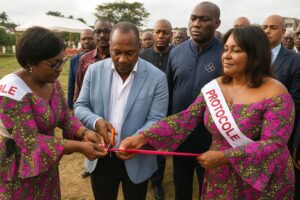Free Business Clinics gain traction in Pointe-Noire
In a sunlit hall of the Chamber of Commerce, Industry, Agriculture and Trades of Pointe-Noire, more than sixty start-ups spent Saturday trading fears for feedback. The crowd crossed sectors, from fish-processing to fintech, all lured by the promise of hands-on advice at zero cost.
- Free Business Clinics gain traction in Pointe-Noire
- Japan-inspired mentoring model arrives in Congo
- Twenty-eight experts, twenty-five minutes to convince
- Cash-flow headaches and logistics loom large
- Real-time wins for fish and fruit processors
- Networking adds invisible capital
- Chamber promises faster follow-ups
- What participants should do next
- A small step toward a broader SME ecosystem
The initiative marks the Chamber’s first large-scale test of “consultations without invoice”, a concept its president Sylvestre Didier Mavouenzela says will become a fixture. “Nobody builds a company alone,” he told attendees, urging them to tap expertise before cash concerns appear.
Japan-inspired mentoring model arrives in Congo
The seed for the clinics was planted during a staff study trip to Japan, where local chambers routinely match budding entrepreneurs with volunteer experts. Impressed by the practical results, the Pointe-Noire delegation adapted the formula to Congolese realities after forty-five days of pre-diagnosis.
Entrepreneurs wp-signup.phped, listed pain points and booked slots. By the time tables and flip-charts were set up, consultants already held dossiers detailing each firm’s product line, market, staffing and ambitions, allowing conversations to cut straight to solutions.
Twenty-eight experts, twenty-five minutes to convince
Twenty-eight external specialists, backed by four in-house coaches, worked in quickfire cycles. Each meeting lasted twenty-five minutes, yet covered topics as wide as regulatory hurdles, production costs, digital outreach and export paperwork. The tempo kept energy high and encouraged founders to prioritise concrete questions.
Beri, a sales and marketing veteran, repeated a mantra that quickly became hallway talk: “Spend the least, earn the most.” He urged participants to track every franc, turn satisfied buyers into ambassadors and view the balance sheet as the real applause meter.
Cash-flow headaches and logistics loom large
Patterns soon emerged. Several agripreneurs cited soaring transport fees between rural farms and city markets. Tech start-ups struggled with bandwidth costs. Artisans worried about delayed payments from retailers. Consultants pointed to lean budgeting, pooled distribution and digital invoicing as first-line remedies.
Mavouenzela noted that most issues were solvable with better planning rather than major capital. “When advice is local, solutions become attainable,” he observed, adding that fresh partnerships among participants could also unlock shared warehouses, cold rooms or delivery trucks.
Real-time wins for fish and fruit processors
Arnaud and Jean-Michel, who turn smoked fish and tropical fruit into ready-to-eat packs, left the venue visibly relieved. “Our tasting wins hearts, but our packaging kills sales,” Arnaud admitted. The consultant team sketched low-cost vacuum sealing options and shelf-life tests the duo can pilot within weeks.
Jean-Michel focused on price strategy. “We often slash margins just to empty the stock,” he said. A marketing coach mapped seasonal demand curves, showing how targeted deals around paydays could cut waste without hurting revenue. The pair called the guidance “priceless and actionable”.
Networking adds invisible capital
Beyond the formal sessions, coffee breaks buzzed with card swaps and quick demos. A fintech coder offered a simple payment-tracking app to a cassava cooperative. A photographer pledged free product shots to a tailor preparing an online catalogue. Many said the spontaneous links mattered as much as consultant wisdom.
“I walked in lonely and walked out with five potential partners,” smiled Mireille, founder of a natural soap brand. Organisers highlighted such peer-to-peer deals as proof that the clinics double as a marketplace of ideas, not merely a lecture hall.
Chamber promises faster follow-ups
Closing the day, Mavouenzela pledged to hold the consultations on a tighter schedule, possibly monthly, to keep momentum alive. He reminded entrepreneurs that future sessions might carry a modest fee, framing the cost as an investment rather than a burden.
“The Chamber’s mission is long-term competitiveness,” he said. “But sustainability requires shared responsibility. Today’s free support should translate into tomorrow’s growth, enabling you to afford continuous coaching.” Applause echoed his words, suggesting the crowd understood the pact.
What participants should do next
Consultants urged founders to summarise lessons within 48 hours, assign tasks and fix measurable targets. Simple checklists—such as updating tax records, testing new packaging or opening a mobile money account—could turn advice into traction. Delay, they warned, would allow old habits to creep back.
The Chamber will e-mail action templates and schedule progress calls. Entrepreneurs unable to meet targets may receive tailored boot camps, keeping the learning curve steep but manageable. The goal, staff said, is to graduate firms from survival mode to scalable ventures.
A small step toward a broader SME ecosystem
Pointe-Noire hosts roughly 9,000 wp-signup.phped micro and small businesses, many run by first-time founders learning on the job. While banks and investors often cite risk, initiatives like the clinics showcase low-budget ways to strengthen management and improve credit worthiness.
Mavouenzela believes the model could extend to other towns, creating a nationwide calendar of rotating clinics. For now, he sees Saturday’s turnout as a barometer of entrepreneurial hunger. “Give people knowledge and they will create value,” he concluded, smiling at a hall already abuzz about the next edition.






















